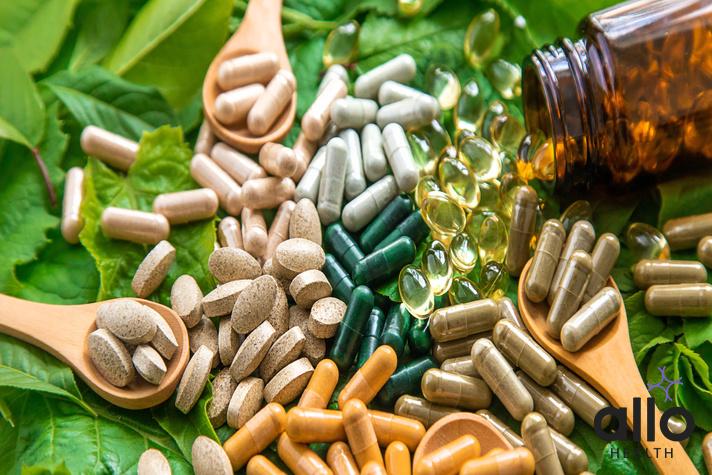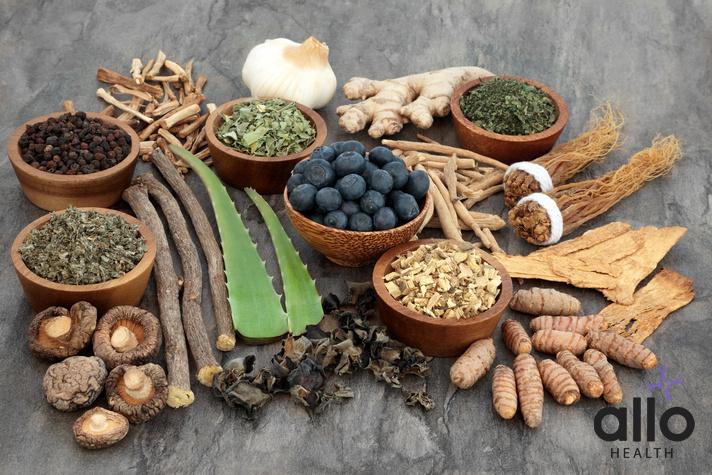Ashwagandha’s Impact on Cholesterol Levels

Allo Health is dedicated to personalized well-being, offering support and trusted information tailored to individual health goals. The platform emphasizes human-generated content, led by a distinguished medical team of experts, including physicians and sexual health specialists. Their commitment to credibility involves rigorous fact-checking, authoritative research, and continuous updates to ensure accurate, up-to-date information. Allo Health's unique approach goes beyond conventional platforms, providing expert-led insights and a continuous commitment to excellence, with user feedback playing a crucial role in shaping the platform's authoritative voice.

Dr.Sushma.V completed MBBS degree from BGS GIMS,bangalore
Why This Was Upated?
Our experts continually monitor the health and wellness space, and we update our articles when new information became available.
Updated on 15 March, 2024
- Article was updated as part of our commitment to diversity, equity, and inclusion.

"The following blog article may discuss medical treatments and interventions. However, it is important to note that the information provided is for general educational purposes only and should not be considered as a substitute for professional medical advice, diagnosis, or treatment. Always seek the guidance of a qualified healthcare professional for personalized medical advice.
Book consultation
Medical treatments are complex and should be tailored to individual circumstances. The information presented in this blog may not be applicable to everyone, as each person's medical condition, history, and needs are unique. Only a qualified healthcare professional can evaluate your specific medical situation, consider relevant factors, and provide appropriate recommendations for diagnosis, treatment options, and monitoring.
It is crucial to note that self-diagnosis, self-medication, or relying solely on the information provided in this blog for treatment decisions can have serious health consequences. "
Ashwagandha, a renowned herb in traditional Ayurvedic medicine, has garnered significant attention for its potential impact on various aspects of health. One area of interest is its effect on cholesterol levels. Studies suggest that Ashwagandha may possess properties that could help regulate cholesterol levels in the body. This herbal remedy has been investigated for its potential to lower LDL (bad) cholesterol while increasing HDL (good) cholesterol, thus potentially contributing to improved cardiovascular health. Understanding Ashwagandha’s role in cholesterol modulation holds promise for holistic health management.
What is Ashwagandha?
Ashwagandha, also known as Withania somnifera and Indian Ginseng is a powerful adaptogenic herb widely used in traditional ayurvedic medicine in the form of treatment for its numerous health benefits, including its positive effects on sexual performance. This traditional medicine has been praised for its ability to reduce stress and anxiety, both of which are known to have a detrimental impact on sexual dysfunction.
Incorporating ashwagandha into your wellness routine, under the guidance of a healthcare professional, may offer several sexual benefits, including reduced stress, improved sex drive, increased testosterone, enhanced sperm count, and better endurance for a more fulfilling sexual experience. A study in 2013 showed that ashwagandha revitalized the testosterone count in fertile men too.
Understanding Cholesterol and its Health Implications
Elevated cholesterol levels stand as a prominent risk factor contributing to atherosclerosis, the progressive narrowing of coronary arteries due to plaque accumulation. This development significantly heightens the likelihood of compromised blood circulation, heart disease, myocardial infarctions, and strokes. While conventional approaches frequently involve statin medications to manage cholesterol levels, exploring alternative modalities like Ayurvedic medicine may also pique interest.
Ayurveda, renowned as one of humanity’s oldest healing traditions, employs a holistic approach encompassing dietary adjustments, lifestyle modifications, herbal supplements, and detoxification therapies to foster overall well-being and disease prevention. However, the efficacy and safety of Ayurvedic practices often come under scrutiny in scientific investigations.
Health Benefits of Ashwagandha

Discovering the health benefits of consumption of this ayurvedic herb ashwagandha also known as “Winter Cherry”.
Blood Sugar Regulation: Ashwagandha extract aids in regulating blood sugar levels by increasing insulin release and improving insulin sensitivity. Studies demonstrate a reduction in blood glucose levels akin to oral diabetes medication effects.
Anti-Cancer Properties: Withaferin, found in ashwagandha, induces cancer cell apoptosis and inhibits further cancer cell growth. Potential benefits observed in various cancers including colon, brain, ovarian, lung, and breast cancers.
Cortisol Reduction: Ashwagandha may lower cortisol levels, mitigating the adverse effects of chronic stress. Clinical trials show significant reductions in cortisol levels, enhancing stress management.
Stress and Anxiety Relief: Ashwagandha exhibits anxiolytic effects by modulating nervous system signals. Studies indicate a notable reduction in anxiety symptoms and improvements in insomnia.
Depression Alleviation: Evidence suggests ashwagandha supplementation may alleviate symptoms of depression. Significant improvements were observed in severe depression symptoms compared to a placebo group.
Testosterone Boost: Some studies suggest ashwagandha supplementation can increase testosterone levels in men. Improved semen quality and decreased oxidative stress were reported, contributing to testosterone elevation.
Fertility Enhancement: Ashwagandha’s potential to boost testosterone may improve semen quality and production. Offers promise for men with infertility trouble, particularly those with low testosterone levels.
Muscle Mass and Strength: Ashwagandha supplementation correlates with increased lean muscle mass, strength, and reduced body fat percentage. Beneficial effects are likely linked to enhanced testosterone production.
Inflammation Reduction: Ashwagandha exhibits anti-inflammatory properties, potentially mitigating chronic inflammation. Studies suggest reductions in C-reactive protein levels, associated with inflammatory triggers.
Cholesterol Management: Animal studies indicate ashwagandha’s efficacy in lowering triglyceride and cholesterol levels. Human studies show modest improvements in cholesterol levels with ashwagandha supplementation.
Brain Function Enhancement: Ashwagandha supplementation shows promise in improving cognitive function and memory. Studies report enhanced task performance, reaction times, and psychomotor skills in healthy individuals.
Natural Remedies and Supplements for High Cholesterol

Modern treatments for high cholesterol involve lifestyle changes and medications like statins.
- Ayurvedic, one of the common herbs approaches includes dietary restrictions, massage, yoga therapy, and breathing techniques.
- People also used the roots and orange-red fruit of ashwagandha for medicinal purposes.
- Behavioral modifications, exercise, cleansing, and heat therapy are also part of Indian Ayurvedic treatment.
- Individualized treatment plans are typical in Ayurveda as they contain healing properties and provide antioxidant effects.
- Studies suggest Ayurvedic practices like dietary modifications and stress reduction can lower cholesterol.
- Medicinal herbs like garlic, guggul, and arjuna are commonly used in Ayurvedic medicine.
- These herbs may be used alone or combined with others like turmeric and ginger.
- Ayurvedic medications such as Mustadi Ghanavti contain various herbs like Cyperus rotundus and Tribulus terrestris.
- Ayurvedic medicines come in different forms including juices, powders, tablets, extracts, and decoctions.
How Ashwagandha Lowers Cholesterol Levels Naturally?

- Regulates Lipid Profile: Ashwagandha contains bioactive compounds that help regulate lipid metabolism, leading to a balanced lipid profile in the body.
- Reduces LDL Cholesterol: Studies suggest that Ashwagandha supplementation can decrease levels of LDL (bad) cholesterol, thereby reducing the risk of cardiovascular diseases.
- Increases HDL Cholesterol: Ashwagandha has been shown to increase levels of HDL (good) cholesterol, which aids in removing LDL cholesterol from the bloodstream, promoting heart health.
- Antioxidant Properties: Its potent antioxidants help prevent lipid peroxidation, which contributes to atherosclerosis, thus reducing cholesterol levels naturally.
- Anti-inflammatory Effects: By reducing inflammation in the arteries, Ashwagandha helps prevent plaque formation and promotes healthy blood flow, manages blood pressure levels further lowers cholesterol.
- Enhances Liver Function: Ashwagandha supports liver function, aiding in the breakdown and elimination of cholesterol from the body.
- Balances Stress Hormones: Chronic stress can elevate cholesterol levels; Ashwagandha’s adaptogenic properties help mitigate stress, indirectly impacting cholesterol levels.
Safety Considerations When Using Ashwagandha to Lower Cholesterol
- Consultation: Always consult with a healthcare professional before starting any new supplement regimen, especially if you have underlying health conditions or are taking medications.
- Dosage: Adhere strictly to recommended dosages as excessive intake may lead to adverse effects such as gastrointestinal upset or interactions with other medications.
- Quality: Ensure you’re using a high-quality Ashwagandha supplement from a reputable source to minimize the risk of contamination or adulteration.
- Allergies: Individuals with known allergies to plants in the Solanaceae family, which includes tomatoes and potatoes, should exercise caution as Ashwagandha belongs to this family.
- Pregnancy and breast-feeding: Avoid Ashwagandha if you’re pregnant or breastfeeding, as its safety in these situations hasn’t been established.
- Monitoring: Regularly monitor your cholesterol levels and overall health while using Ashwagandha to ensure it’s effectively lowering cholesterol without causing any adverse effects.
- Discontinue if adverse reactions occur: If you experience any negative side effects, discontinue use and consult a healthcare professional immediately.
Incorporating Ashwagandha with Other Natural Remedies

- Rhodiola Rosea: Pairing Ashwagandha with Rhodiola Rosea can amplify stress-relief benefits and improve cognitive function.
- Turmeric: Combining Ashwagandha with turmeric enhances its anti-inflammatory properties and supports joint health.
- Holy Basil (Tulsi): Incorporating Holy Basil alongside Ashwagandha can further reduce stress levels and promote overall well-being.
- L-theanine: Mixing Ashwagandha with L-theanine can heighten relaxation effects and improve sleep quality.
- Ginseng: Utilizing Ashwagandha with Ginseng fruit may boost energy levels and enhance mental clarity.
- Milk Thistle: Pairing Ashwagandha with Milk Thistle can aid in liver detoxification and improve overall liver health.
- Chamomile: Combining Ashwagandha with Chamomile can promote relaxation and alleviate symptoms of anxiety.
- Black Pepper: Adding Black Pepper to Ashwagandha supplements can enhance its bioavailability, ensuring better absorption in the body for maximum effectiveness.
Side Effects of Ashwagandha
Although Ashwagandha is generally considered safe and well-tolerated, it may cause some side effects, especially when taken in high doses.
- Drowsiness
- Nausea and vomiting
- Diarrhea
- Skin rash
Although less common, some individuals have reported the following side effects:
- Giddiness or hyperactivity
- Dry mouth
- Stuffy nose
- Cough
- Decreased appetite
- Constipation
It is important to be aware of these potential side effects when considering the use of ashwagandha as a dietary supplement. Always consult with a health provider before adding any new supplement to your routine, especially if you have underlying medical conditions or are taking other medications.
Conclusion
In conclusion, the research on Ashwagandha’s impact on cholesterol levels presents promising findings. Through various studies, it has been demonstrated that Ashwagandha supplementation and ashwagandha plant may contribute to favorable changes in lipid profiles, potentially lowering LDL cholesterol and triglyceride levels while increasing HDL cholesterol. These effects suggest a potential role for Ashwagandha in promoting cardiovascular health. However, further research is warranted to elucidate the mechanisms involved and to establish optimal dosages and treatment durations. Nevertheless, these preliminary results underscore the potential of Ashwagandha as a natural adjunctive therapy for managing cholesterol levels and reducing the risk of cardiovascular diseases.
Most Asked Questions
-
What is Ashwagandha, and how does it impact cholesterol levels?
Ashwagandha is an ancient medicinal herb used in traditional Indian Ayurvedic medicine. Studies suggest it may help lower cholesterol levels by reducing LDL (bad) cholesterol and triglycerides while increasing HDL (good) cholesterol.
-
How does Ashwagandha lower LDL cholesterol?
Ashwagandha contains bioactive compounds that may inhibit the formation of cholesterol and promote its excretion. Additionally, it may reduce the absorption of cholesterol in the intestines, contributing to lower LDL levels.
-
Is Ashwagandha safe for cholesterol management?
Research indicates that Ashwagandha is generally safe when consumed in recommended doses. However, individuals with existing medical conditions or those taking medications should consult a healthcare professional before incorporating Ashwagandha into their routine.
-
Can Ashwagandha be used as a standalone treatment for high cholesterol?
While Ashwagandha shows promise in managing cholesterol levels, it is not a standalone treatment. A balanced diet, regular exercise, and other lifestyle modifications are essential components of cholesterol management.
-
Are there any side effects associated with Ashwagandha use?
Although Ashwagandha is considered safe for most people, some individuals may experience mild side effects such as digestive upset or drowsiness. It's crucial to follow recommended dosages and consult a healthcare provider if any adverse reactions occur.






































